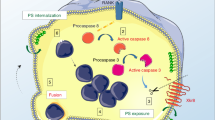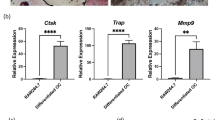Abstract
Macrophage colony-stimulating factor (M-CSF) is known as one of the factors essential for osteoclast development. In the present study, we examined effects of M-CSF on the apoptotic pathway of osteoclast precursors and their underlying molecular mechanisms. Osteoclast precursors underwent apoptosis in the absence of M-CSF, even in the presence of receptor activator of NF-kB ligand (RANKL). Active caspase-3 and -9 were detected in the osteoclast precursors and treatments of precursors with their specific inhibitors (Z- DEVD-FMK and Z-LEHD-FMK) decreased the apoptosis. M-CSF decreased apoptosis in a dose-dependent manner with decreasing in active caspases-3 and -9 levels and up-regulating Bcl-XL. Those effects of M-CSF on inhibiting apoptosis of osteoclasts precursor by regulating anti-apoptotic signals was more effective when combined with RANKL. These results demonstrate that M-CSF acts as a survival factor for the osteoclast precursors. Furthermore, it is believed that the apoptosis of osteoclast precursors may be involved in the activation of caspase-9 and that M-CSF may promote their survival through Bcl-XL-induced inhibition of caspase-9 activation.
Similar content being viewed by others
Article PDF
Author information
Authors and Affiliations
Rights and permissions
This is an Open Access article distributed under the terms of the Creative Commons Attribution Non-Commercial License (http://creativecommons.org/licenses/by-nc/3.0/) which permits unrestricted non-commercial use, distribution, and reproduction in any medium, provided the original work is properly cited.
About this article
Cite this article
Woo, K., Kim, HM. & Ko, J. Macrophage colony-stimulating factor promotes the survival of osteoclast precursors by up-regulating Bcl-XL. Exp Mol Med 34, 340–346 (2002). https://doi.org/10.1038/emm.2002.48
Published:
Issue date:
DOI: https://doi.org/10.1038/emm.2002.48
Keywords
This article is cited by
-
Dendritic Cell-Associated Osteoclastogenesis and Bone Loss
Clinical Reviews in Bone and Mineral Metabolism (2009)
-
Ability of breast cancer cell lines to stimulate bone resorbing activity of mature osteoclasts correlates with an anti-apoptotic effect mediated by macrophage colony stimulating factor
Apoptosis (2006)



